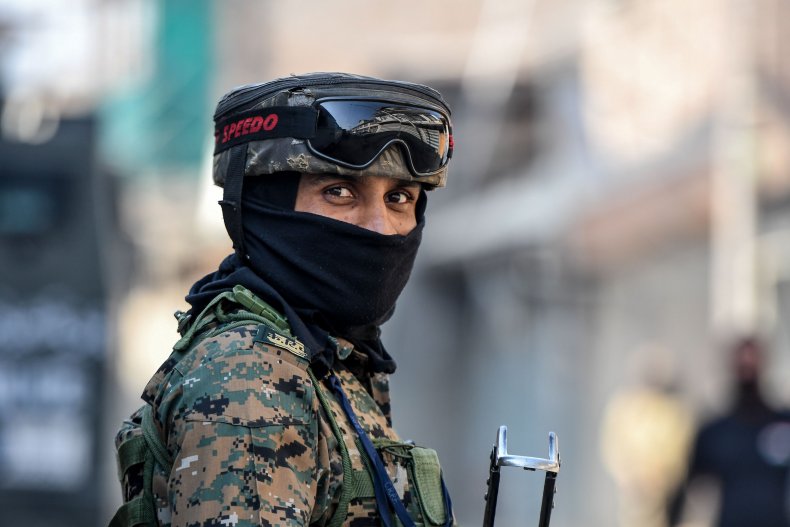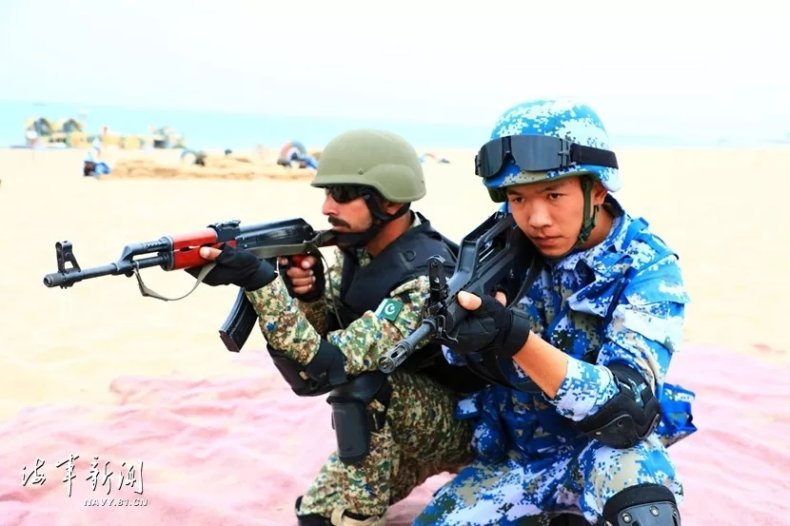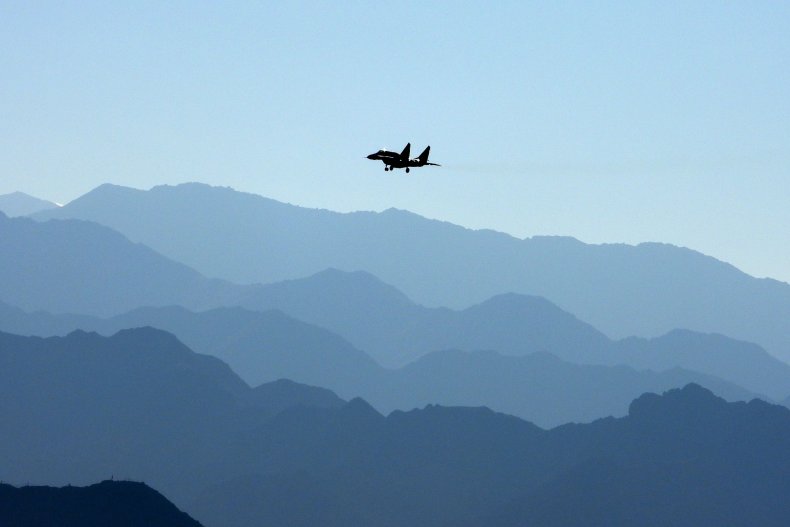TOP OF THE WORLD MA
India and Pakistan Clash on Border As China Conflict Looms Heavy
Pakistani Foreign Minister Qureshi: India Created 'Very Dangerous Situation' In Kashmir
India and Pakistan Clash on Border As China Conflict Looms Heavy
Pakistani Foreign Minister Qureshi: India Created 'Very Dangerous Situation' In Kashmir
India has engaged in new clashes across its long-disputed border with Pakistan, while it remains locked in another standoff on its border with China, one that threatens to erupt into a new regional conflict in Asia.
Early Friday, the Indian Army told Newsweek that "Pakistan initiated an unprovoked Ceasefire Violation" with attacks by mortars and other weapons at the village of Kanzalwan in the Gurez sector of Bandipora district, located along the Line of Control (LOC) that divides the two rivals in Kashmir.
The official communication from India was terse.
A "befitting response is being given," the military said.
There are reports of recurring exchanges of fire in the tense region, including an earlier incident two days ago. Islamabad blamed the confrontations on New Delhi, arguing that in both cases the "Indian Army resorted to unprovoked fire in Nekrun Sector, targeting military posts and civilians alike across the Line of Control with automatic weapons, rockets and heavy mortars," a Pakistani official told Newsweek.
"These unilateral provocations were responded [to] appropriately by [the] Pakistan Army," the official said.
"Indian Army persistently targets civil population residing on its side of the LOC while they are busy in routine chores," the official added. "Such unprofessional and unethical acts are confounded by allegations of sponsoring terrorism across LOC."

Early Friday, the Indian Army told Newsweek that "Pakistan initiated an unprovoked Ceasefire Violation" with attacks by mortars and other weapons at the village of Kanzalwan in the Gurez sector of Bandipora district, located along the Line of Control (LOC) that divides the two rivals in Kashmir.
The official communication from India was terse.
A "befitting response is being given," the military said.
There are reports of recurring exchanges of fire in the tense region, including an earlier incident two days ago. Islamabad blamed the confrontations on New Delhi, arguing that in both cases the "Indian Army resorted to unprovoked fire in Nekrun Sector, targeting military posts and civilians alike across the Line of Control with automatic weapons, rockets and heavy mortars," a Pakistani official told Newsweek.
"These unilateral provocations were responded [to] appropriately by [the] Pakistan Army," the official said.
"Indian Army persistently targets civil population residing on its side of the LOC while they are busy in routine chores," the official added. "Such unprofessional and unethical acts are confounded by allegations of sponsoring terrorism across LOC."

A member of the Indian security forces stands guard during clashes between protesters and government forces in the Batamaloo area of Srinagar, India-administered Kashmir on September 17. Indian authorities are contending with riotous gatherings of hundreds of angry residents in the wake of a firefight that left three suspected rebels and a young woman dead, as well as worsening unrest with both Pakistani and Chinese forces on two separate fronts.TAUSEEF MUSTAFA/AFP/GETTY IMAGES
The Pakistani Foreign Ministry also accused India on Thursday of wounding three civilians at the village of Andrala Nar in cross-border shelling against the Hotspring and Jandrot Sectors. A senior Indian diplomat was reportedly summoned in response to that incident, which the ministry argued was intended to distract from a deteriorating humanitarian and security situation in India-administered Kashmir.
The territory has been in an effective state of lockdown since August of last year, when a constitutional change removed Jammu and Kashmir State's semi-autonomous status and flooded it with paramilitary forces. The restive state hosts an insurgency that New Delhi accuses Islamabad of backing, resulting in numerous infiltration attempts and street battles.
Such confrontations have often proven controversial.
In another statement sent to Newsweek on Friday, the Indian Army acknowledged preliminary evidence indicating its personnel "exceeded" their powers and "contravened" their disciplinary code in a July incident that resulted in the deaths of three Kashmiri men whose families have argued they were laborers with no affiliation to militant groups.
"Their involvement with terrorism or related activities is under investigation by the police," the statement said. "Indian Army is committed to ethical conduct of operations. Further updates on the case will be given periodically without affecting due process of the law of the land."
But Islamist mujahideen groups such as Jaish-e-Mohammed do continue to operate throughout Kashmir, eliciting criticism not only from India, but its increasingly close major power partner, the United States.
In a joint statement adopted on the eve of the 19th anniversary of the 9/11 attacks against the U.S., Washington and New Delhi "underlined the urgent need for Pakistan to take immediate, sustained, and irreversible action to ensure that no territory under its control is used for terrorist attacks, and to expeditiously bring to justice the perpetrators of such attacks."

The Pakistani Foreign Ministry also accused India on Thursday of wounding three civilians at the village of Andrala Nar in cross-border shelling against the Hotspring and Jandrot Sectors. A senior Indian diplomat was reportedly summoned in response to that incident, which the ministry argued was intended to distract from a deteriorating humanitarian and security situation in India-administered Kashmir.
The territory has been in an effective state of lockdown since August of last year, when a constitutional change removed Jammu and Kashmir State's semi-autonomous status and flooded it with paramilitary forces. The restive state hosts an insurgency that New Delhi accuses Islamabad of backing, resulting in numerous infiltration attempts and street battles.
Such confrontations have often proven controversial.
In another statement sent to Newsweek on Friday, the Indian Army acknowledged preliminary evidence indicating its personnel "exceeded" their powers and "contravened" their disciplinary code in a July incident that resulted in the deaths of three Kashmiri men whose families have argued they were laborers with no affiliation to militant groups.
"Their involvement with terrorism or related activities is under investigation by the police," the statement said. "Indian Army is committed to ethical conduct of operations. Further updates on the case will be given periodically without affecting due process of the law of the land."
But Islamist mujahideen groups such as Jaish-e-Mohammed do continue to operate throughout Kashmir, eliciting criticism not only from India, but its increasingly close major power partner, the United States.
In a joint statement adopted on the eve of the 19th anniversary of the 9/11 attacks against the U.S., Washington and New Delhi "underlined the urgent need for Pakistan to take immediate, sustained, and irreversible action to ensure that no territory under its control is used for terrorist attacks, and to expeditiously bring to justice the perpetrators of such attacks."

Members of the Pakistani and Chinese naval forces participate in the Sea Guardians 2020 exercises in the Arabian Sea in January. Pakistan has become a hub in China's Belt and Road Initiative and has security ties between the two have grown considerably as well.CHINESE PEOPLE'S LIBERATION ARMY NAVY
In a statement sent to Newsweek, the Pakistani Foreign Ministry said it "strongly rejects the unwarranted references" to the country, which it said is "most affected by cross-border terrorism, sponsored and supported by India.
The Pakistani statement emphasized its struggle had global support.
"The international community also recognizes Pakistan's efforts, sacrifices and successes in the fight against terrorism," the statement said.
Backing up Islamabad in this argument was Beijing, where Chinese Foreign Ministry spokesperson Zhao Lijian used similar language in asserting last week that "Pakistan's tremendous efforts and sacrifice in fighting terrorism should be recognized and respected by the international community."
China's weigh-in is no coincidence.
Deep economic and security ties between the People's Republic and the Islamic Republic have boosted what China refers to as its "all-weather strategic cooperative partnership" with Pakistan. At the same time, a series of bloody clashes between Chinese and Indian troops in the Himalayan highlands means Beijing and New Delhi's relations have been put to their biggest test in decades.
India's past with China may not be as bloody as its history with Pakistan, with which it fought four deadly wars since their 1948 partition. India and China too, however, fought over disputed territory in 1962 and this bitter experience threatened to repeat this year, with both sides cheered on my nationalist tides at home.
The two militaries have engaged in a series of skirmishes at their disputed Line of Actual Control since May, with casualties on both sides inflicted in June. Both sides have poured in reinforcements, and mutual rising tensions led earlier this month to the first gunfire erupting at this frontier in nearly half a century.

In a statement sent to Newsweek, the Pakistani Foreign Ministry said it "strongly rejects the unwarranted references" to the country, which it said is "most affected by cross-border terrorism, sponsored and supported by India.
The Pakistani statement emphasized its struggle had global support.
"The international community also recognizes Pakistan's efforts, sacrifices and successes in the fight against terrorism," the statement said.
Backing up Islamabad in this argument was Beijing, where Chinese Foreign Ministry spokesperson Zhao Lijian used similar language in asserting last week that "Pakistan's tremendous efforts and sacrifice in fighting terrorism should be recognized and respected by the international community."
China's weigh-in is no coincidence.
Deep economic and security ties between the People's Republic and the Islamic Republic have boosted what China refers to as its "all-weather strategic cooperative partnership" with Pakistan. At the same time, a series of bloody clashes between Chinese and Indian troops in the Himalayan highlands means Beijing and New Delhi's relations have been put to their biggest test in decades.
India's past with China may not be as bloody as its history with Pakistan, with which it fought four deadly wars since their 1948 partition. India and China too, however, fought over disputed territory in 1962 and this bitter experience threatened to repeat this year, with both sides cheered on my nationalist tides at home.
The two militaries have engaged in a series of skirmishes at their disputed Line of Actual Control since May, with casualties on both sides inflicted in June. Both sides have poured in reinforcements, and mutual rising tensions led earlier this month to the first gunfire erupting at this frontier in nearly half a century.

An Indian Air Force fighter jet flies over a mountain range in Leh, the joint capital of the union territory of Ladakh bordering China, on September 15. India and China have agreed to disengage from their four-month standoff but both sides appear to have stood their ground.MOHD ARHAAN ARCHER/AFP/GETTY IMAGES
The defense chiefs and top diplomats of the two countries have since met in Russia, a mutual partner, in an effort to ease the precarious situation. While Chinese and Indian officials continue to accuse one other of trying to "change the status quo" at the poorly marked divide between India's Ladakh and China's Aksai Chin, they have agreed to a five-point de-escalation plan.
The plan calls for boosting bilateral ties, withdrawing troops, adhering to previous deals, maintaining communication and establishing new confidence-building measures to avoid future incidents.
But in the immediate aftermath of the latest incident, the Indian Army told Newsweek that as of last week there was "no change on the ground," and both sides were sticking to their stories.
"The Chinese border troops have always strictly observed the relevant agreements between the two countries and are committed to safeguarding China's territorial sovereignty and maintaining peace and stability in the border areas," Chinese Foreign Ministry spokesperson Wang Wenbin told reporters at a press conference Thursday.
Wenbin claimed that India was solely responsible for the dispute.
"What is pressing now is that the Indian side should immediately correct its mistake, disengage on the ground as soon as possible and take concrete actions to ease the tension and lower the temperature along the border," he said.
The defense chiefs and top diplomats of the two countries have since met in Russia, a mutual partner, in an effort to ease the precarious situation. While Chinese and Indian officials continue to accuse one other of trying to "change the status quo" at the poorly marked divide between India's Ladakh and China's Aksai Chin, they have agreed to a five-point de-escalation plan.
The plan calls for boosting bilateral ties, withdrawing troops, adhering to previous deals, maintaining communication and establishing new confidence-building measures to avoid future incidents.
But in the immediate aftermath of the latest incident, the Indian Army told Newsweek that as of last week there was "no change on the ground," and both sides were sticking to their stories.
"The Chinese border troops have always strictly observed the relevant agreements between the two countries and are committed to safeguarding China's territorial sovereignty and maintaining peace and stability in the border areas," Chinese Foreign Ministry spokesperson Wang Wenbin told reporters at a press conference Thursday.
Wenbin claimed that India was solely responsible for the dispute.
"What is pressing now is that the Indian side should immediately correct its mistake, disengage on the ground as soon as possible and take concrete actions to ease the tension and lower the temperature along the border," he said.
No comments:
Post a Comment